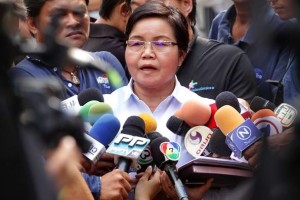Thailand: When Opposition “Turns to Foreigners” for Aid

An opposition lawyer might seem like a relatively insignificant piece on the grand chessboard of geopolitics, but when the guns are silent, and proxy wars are not possible, these foot soldiers of foreign interests fight Wall Street and Washington’s battles on a daily basis.
To say that Thailand-based opposition lawyer Benjarat Meethien is just now “turning to foreigners” for aid is not entirely accurate. She has already been working with foreign special interests for some time to advance her own career and the interests of those foreigners who fund her work.
She claims to be a “human rights lawyer,” however the entirety of her clients are linked to ousted dictator Thaksin Shinawatra and his political machine, and in particular, those elements of his political machine involved in mass murder, terrorism, mass arson, and all other forms of violence and coercion. It can be considered ironic that Benjarat claims to be upholding “human rights,” when attempting to defend those who have trampled such rights the most.
Benjarat is a member of “Thai Lawyers for Human Rights” (TLHR), funded by the US State Department via the National Endowment for Democracy (NED). Because TLHR does not disclose its foreign funding on its website, it is assumed that like other foreign-backed NGOs operating in Thailand, it too is receiving funding from other organizations. On its Facebook account it proudly lists its “Human Rights Award from French [Embassy].”
Its US government funding and its European awards means it should be no surprise that when difficulties in advancing its agenda in Thailand are met, it turns to the West for further aid.
Thailand’s Nation newspaper reported in an article titled, “Lawyer for red-shirt complains to EU,” that:
[The] lawyer for a man suspected of involvement in the “Khon Kaen model” plot to allegedly carry out attacks after the 2014 coup has sought help from the European Union (EU) over alleged intimidation by authorities.
Benjarat Meethien said that she had suffered intimidation by police and military officers after she filed a petition against authorities under the National Council for Peace and Order (NCPO) for dealing with a case involving her client.
In her letter submitted to the EU last week, the lawyer reported that the NCPO and authorities treated people unfairly.
Benjarat’s reasoning is incomprehensible when one asks – just what precisely does Europe have to do with “human rights” in Thailand, or Thailand’s internal politics in any shape, form, or way? Has Benjarat missed coverage of the recent and still lingering “migrant crisis” the EU’s own warmongering triggered in the first place, and its subsequent attempts to turn away desperate, homeless refugees?
This selective ‘concern’ for human rights reveals that both the EU and actors like Benjarat merely use rights advocacy to advance their political agendas, and gladly run roughshod over them at the first moment of convenience.
The Bigger Picture – American Primacy in Asia & the Containment of China
In reality, Benjarat is an agent of foreign interests, merely hiding behind human rights advocacy. The West has backed not only NGOs like TLHR and individuals like Benjarat, but also the political movement her NGO is defending the terrorists of. In other words, the US has created a violent political front to divide and undermine Thailand, and an army of faux-NGOs to portray any attempt to hold this front accountable as an “attack” on “human rights.”
It is a game that repeats itself not only many times over in Thailand, but across the rest of Asia, and indeed, around the world. US interests in Thailand and Southeast Asia specifically, is not only primacy over the markets and political systems there, but to take that influence and wield it against Beijing in the form of a united Southeast Asian front.
As much has been admitted since the 1970’s in the infamous “Pentagon Papers.”
Three important quotes from these papers reveal this strategy. It states first that:
“…the February decision to bomb North Vietnam and the July approval of Phase I deployments make sense only if they are in support of a long-run United States policy to contain China.”
“China—like Germany in 1917, like Germany in the West and Japan in the East in the late 30′s, and like the USSR in 1947—looms as a major power threatening to undercut our importance and effectiveness in the world and, more remotely but more menacingly, to organize all of Asia against us.”
“there are three fronts to a long-run effort to contain China (realizing that the USSR “contains” China on the north and northwest): (a) the Japan-Korea front; (b) the India-Pakistan front; and (c) the Southeast Asia front.”
This agenda has continued unchanged through the decades, precisely along the three fronts outlined decades ago. America’s “pivot to Asia” is merely the latest manifestation of this method of containment aimed at Beijing. Despite claiming otherwise ahead of a recent US-ASEAN summit, countering China quickly became the main talking point tabled by the US.
What may seem like a small episode of internal political squabbling in the grand scheme of geopolitics, when following the money and connecting it to stated US foreign policy, the work of those like Benjarat and her TLHR becomes an increasingly telling harbinger of a much larger and menacing agenda aimed at Asia.
Tony Cartalucci is a Bangkok-based geopolitical researcher and writer, especially for the online magazine “New Eastern Outlook”.

